As part of the official calendar of the International Year of Artisanal Fisheries and Aquaculture (IYAFA 2022), FAO and others supported the organisation of a Small-Scale Fisheries Summit from 2 to 4 September 2022 in preparation of FAO’s 35th Committee of Fisheries (COFI) convened the following week to hear about the bi-annual World Fisheries and Aquaculture Report 2022 and give orientations for future work. Mundus maris contributed an Africa focused session to the SSF Summit.
With COFI nearing, in collaboration with the International Planning Committee on Food Sovereignty (IPC) and its Working Group on Fisheries, FAO had organised a SSF Summit in Rome. As of 3 September the summit opened to more organisations gathering some hundred participants. They represented small-scale fishers and aquaculturists, indigenous peoples, civil society groups supporting their work and other interested parties and gathered to prepare their participation at the COFI meeting from 5 to 9 September at FAO HQ in Rome. It was to be the first in-person encounter of selected SSF representatives with COFI members in four years, interrupted by the pandemic.
From the early morning participants we chatting in groups and milling around to greet old friends and collaborators, meet new acquaintances and exchange the latest news.
Convened in the vast area of the former central slaughter houses in Rome, now a cultural and meeting center a little bit off the beaten tracks of officialdom, the place offered nice, functional facilities and a relaxed atmosphere. Simultaneous translation was offered for English, French, Spanish, Portuguese, Arabic and Turkish to put participants at ease as much as possible for expressing themselves.
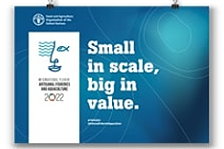
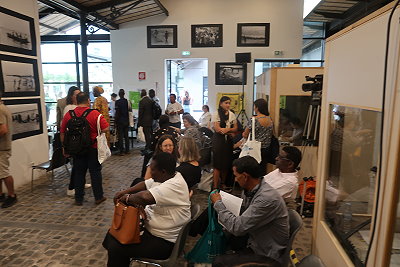
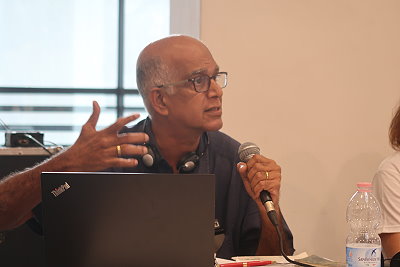
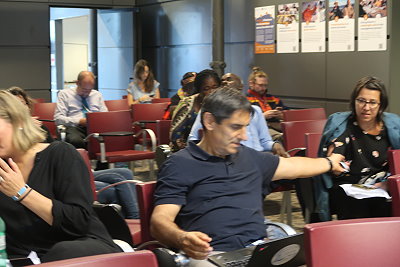
The entire morning and part of the afternoon of Saturday, 3 September, was dedicated to feed back results of the preparatory work of the IPC in plenary and give room to statements from a series of representatives of small-scale fisheries organisations from different parts of the globe. One entire session was dedicated to report on the different case studies led by the International Collective in Support for Fishworkers (ICSF) and advances in recovering the exhausted resources of the Mediterranean under the leadership of the General Committee for the Mediterranean (GFCM) and WWF.
The IYAFA Secretariat had sent out invitations for financial and in kind support through workshops. Mundus maris responded by proposing a workshop with focus on implementing the SSF Guidelines through the work of the SSF Academy. The Secretariat suggested to enlarge the scope with a broader perspective on African experiences, which we happily accepted.
Small-scale fisheries are under intense pressure across the continent. Yet, participation and dialogue processes are shown time and again to be crucial for successful cases of defending the rights and livelihoods of artisanal fishers, men and women. They struggle in the face of multiple challenges, from resource scarcity and the need for equitable arrangements towards recovery, access to land, markets, credit and social services.
The session offered some first hand experiences with strengthening capacities of SSF in Senegal to provide operational support to the SSF Guidelines through the SSF Academy. Some introductory slides together with a short video illustrated early results of work of the Academy. The moderator, Cornelia E Nauen of Mundus maris, also gave room to the self-presentation of Africa-based organisations, notably AWFISHNET (African Women in Fisheries Network) presented by Nedwa Nech from Mauritania, and CAOPA (African Confederation of Artisanal Fisheries Professional Organizations) by its president Gaoussou Guèye from Senegal.
All speakers emphasised the need for men and women active in SSF to know about their rights and the importance of making information and access to knowledge available in local languages. Thus, Gaoussou Guèye underscored the usefulness of the Wolof version of an introductory video to the Guidelines for CAOPA’s work in Senegal, which had been produced with help of Mundus maris. Other tools shortly presented were teaching aids on the ecosystem approach to fisheries for fishers and their organizations together with a new android app (FishBase Guide available free of charge in the Google Play Store) that visualised minimum, optimum and maximum size when typing in a vernacular or common fish name. That new tool could be used equally for teaching purposes, by fishers to maximise catch by targeting the optimum size or by women fish traders to position their products more easily up-market.
The focus was on experiences with promoting the implementation of the SSF Guidelines. The gathering was one of the four parallel sessions in the afternoon, one of which focused on financial support and naturally drew most participants. The session with a focus on Africa counted a mixed public with relatively few African participants, but nevertheless witnessed some lively discussions providing food for thought. One cautioning comment about new well to do consumer groups in fast urbanising Africa who will likely prefer supermarket-style purchases to traditional marketing channels will require more attention. The early signs of a trend turning women entrepreneurs in the post harvest sector to labourers in processing plants is already observable in some places.
The introductory slides on the SSF Academy experience can be downloaded here. Learn more about IYAFA and the activities on the dedicated website of FAO here. The photo gallery of the SSF Summit can be directly accessed here. The recording of the High Level Event on IYAFA 2022 at the subsequent COFI meeting, can be followed here on the FAO website.
Text by Cornelia E Nauen
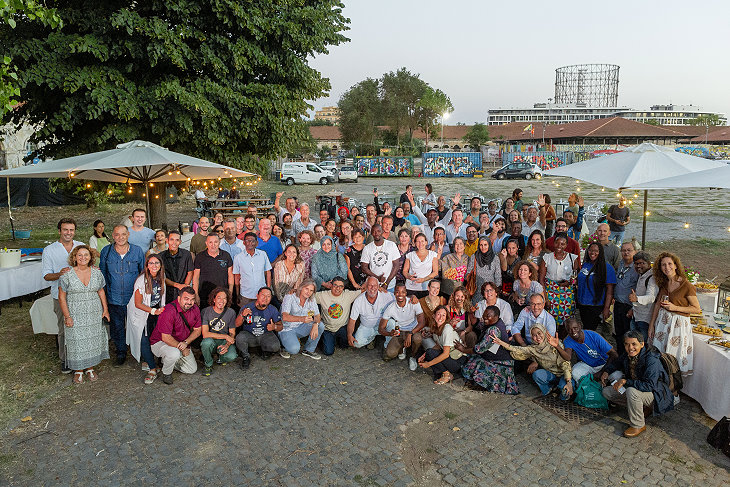
Small-Scale Fisheries Academy
- Make Fishing Fair in the EU, 25 March 2025
- Human – Biodiversity Relationships Across Scales
- World Fisheries Day, 21 November 2024, celebrated in Nigeria
- Mundus maris participated in the 2024 World Fisheries Day organized by Canoe and Fishing Gear Association of Ghana (CaFGOAG).
- Mundus maris contribution to the UNOC3 public consultation
- Small-Scale Fisheries Summit in Rome, 5-7 July 2024
- Regional Symposium on European Small-Scale Fisheries, Larnaca, Cyprus, 1-3 July 2024
- Baltic Fisheries Emergency Meeting, Brussels, 26 June 2024
- Ambivalent role of Market and Technology in the Transitions from Vulnerability to Viability: Nexus in Senegal SSF
- Shell fisheries as stewardship for mangroves
- African edition of 4WSFC in Cape Town, 21 to 23 November 2022
- World Fisheries Day, 21 November 2023
- Webinar: Nigeria’s Fisheries challenges and opportunities
- Presenting the FishBase app at the Symposium in Tervuren
- MARE Conference on Blue Fear – Mundus maris reflects
- The Transition From Vulnerability to Viability Through Illuminating Hidden Harvests, 26 May 2023
- EGU sessions focused on geoethics and joint learning, 23-28 April 2023
- Solidarity with artisanal fishers in Senegal and Mauritania
- The legal instruments for the development of sustainable small-scale fisheries governance in Nigeria, 31 March 2023
- Tools for Gender Analysis: Understanding Vulnerability and Empowerment, 17 February 2023
- Community resilience: A framework for non-traditional field research, 27 January 2023
- Sustainability at scale – V2V November webinar
- European edition of 4WSFC in Malta, 12-14 September 2022
- Mundus maris contributes to SSF Summit in Rome
- Women fish traders in Yoff and Hann, Senegal, victims or shapers of their destiny?
- The Academy continues its work in Yoff
- Illuminating the Hidden Harvest – a snapshot
- Virtual launch event FAO: International Year of Artisanal Fisheries and Aquaculture
- The Small-Scale Fisheries Academy as a source of operational support to PA Guidelines
- World Fisheries Congress, Adelaide, 20-24 September
- Mundus maris supports the fight of Paolo, the fisher, in Tuscany, Italy
- Catching-up – SSF Academy Yoff, 27 Febr. 2021
- Strengthening capacities of the actors for sustainable small-scale fisheries
- Testing training methods during the pilot phase of the SSF Academy in Senegal
- A premiere – launch of a Small-Scale Fisheries Academy in Senegal
